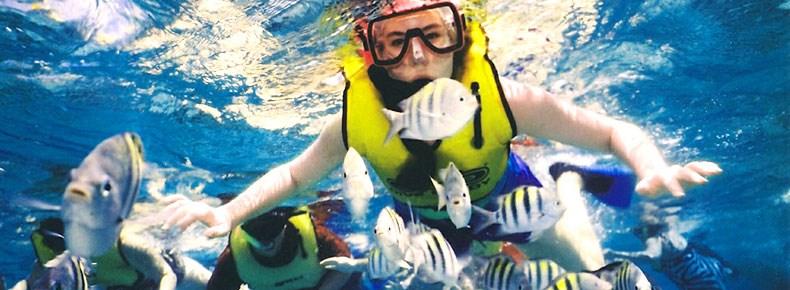Do Your Bit To Preserve The Great Barrier Reef

Did your wanderlust take
you all the way to Cairns to discover and experience the Great Barrier Reef in
all its brilliance and glory, so why wait to experience it! But, going over the
fact that it is the world’s largest and most complex coral reef ecosystem and a
UNESCO World Heritage area, person visiting it or associated with it should
take extra care to treat this treasured gift of nature with greatest respect!
As tourism is the largest money spinner on the reef, the Cairns Great Barrier
Reef has over a million of tourists visiting it each year. With its unique diversity
and richness, the reef has something for everyone dropping in and promises to
offer the most rewarding experiences on every visit to see its wonders. So now
the question is, how to be responsible visitors and enjoy everything related to
the reef without causing any damage to it in any way?
As a tourist, all visitors to the reef are bound to do their bit to preserve
and protect the Great
Barrier Reef by choosing tour operators who are eco-certified, who support marine
conservation initiatives as well as promote sustainable diving and snorkelling
practices.
All such tour operators who go the extra mile when it comes to maintaining
ecologically sustainable reef etiquette act as vital cogs in the wheel that preserve
this spectacular underwater landscape. This will in return support this industry
to flourish in the years to come too.
Other than opting for a dependable tour operator, it would help to spread
awareness about the dos and don’ts related to the Great Barrier Reef to help protect
this rare ecological wonder for all generations to come.
It’s also worth noting that Great Barrier Reef snorkelling and diving tours top
in a list of famous ways to enjoy some time up-close with the mesmerizing
marine life right in the middle of the magnificent coral gardens. These, of course,
come under the umbrella of low-impact reef activities. However, there can be
damage caused by careless and all-too-curious snorkelers and divers who are
unable to maintain better control and balance in the water.
It’s very significant for a snorkeller or a diver to familiarise themselves
with their gear, wetsuits, equipment, cameras and practice buoyancy control
over sand patches before going nearby the reefs. Your dive gear should be
properly secured so that it doesn’t get tangled on the reef and you must be also
be properly weighted before you dive close to a reef.
Take care to move slowly and deliberately underwater with no sudden disturbing movements
or rapid variations in direction. Avoid going near or touching the reef, plants
or animals. Stay clear of free-swimming animals, refrain from feeding them and
avoid make loud noises underwater.
All of the above comes under basic reef etiquette which needs to be followed by
all and sundry if they intend to minimize disturbance to the reef and its
abundance of marine life.
The Great Barrier Reef is dotted by over 900 islands and coral cays which
appear like pristine jewels abundant in flora and fauna that have been
preserved for centuries with minimal human interference. To make a pit stop at
one or more of these islands is a must-do on your Great
Barrier Reef day tour, but it is also the
added responsibility of all visiting that you treat it with child’s gloves, make
the most of its natural beauty and leave back nothing except a few of your
footprints in the sand behind.
It is also suggested that these islands should be visited during high-tides as
much as possible to cut down any damage to coral reef flats. Also, visitors are
requested to dust off all dirt, seeds and all other contaminants right before
going towards the island. Also, you are requested to not deviate from the
marked trails without trampling on or destroying surrounding vegetation. You
should also refrain from feeding animals, making loud sounds or disturbing
nesting seabirds or sea turtles. It is the least that everyone can do to respect
the island by leaving behind all natural treasures of the land as it is and taking
all the rubbish back to the mainland so that it can be disposed properly.
These are but baby steps and drops in the ocean when it comes to doing what
needs to be done to preserve these fragile natural sanctuaries. But if every
one of us, every local, tourist and tour operator actively participate in
staying true to their individual responsibility, be rest assured, it will result
in the greater good of the Great Barrier Reef and eventually of the world!

